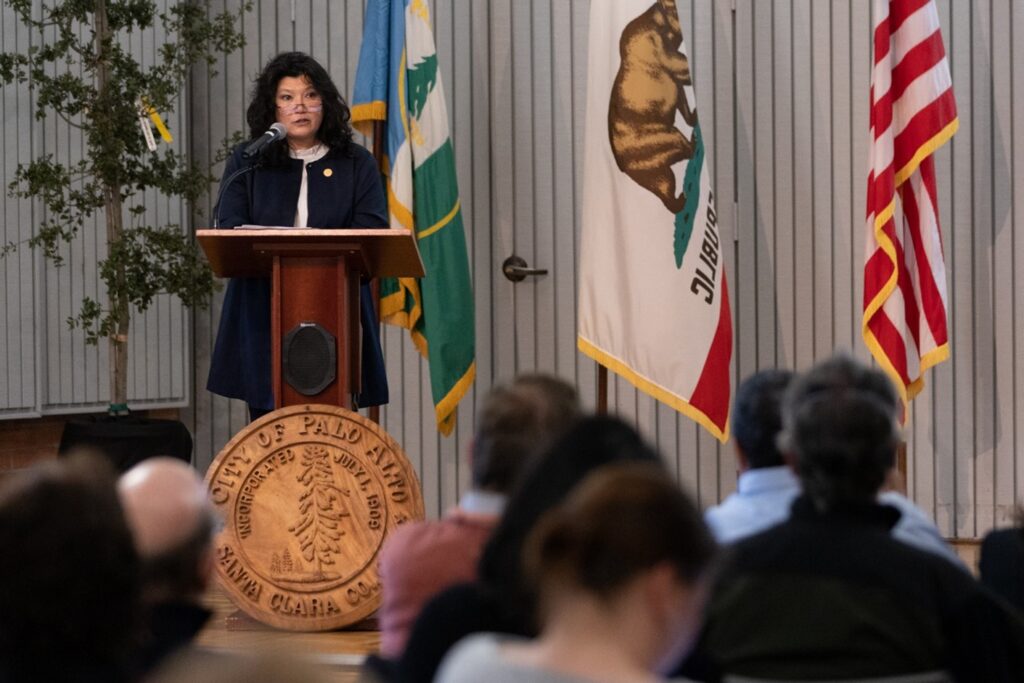Mayor suggests ambitious targets make it impossible for cities to achieve affordable-housing goals
by Gennady Sheyner / Palo Alto Weekly
Uploaded: Wed, Mar 22, 2023, 11:50 pm 12
 Palo Alto Mayor Lydia Kou speaks at the State of the City event at the Palo Alto Art Center on March 22, 2023. Photo by Magali Gauthier.
Palo Alto Mayor Lydia Kou speaks at the State of the City event at the Palo Alto Art Center on March 22, 2023. Photo by Magali Gauthier.
Palo Alto Mayor Lydia Kou took a swing on Wednesday at state housing mandates during her “State of the City” address and warned that recent laws could render the council helpless to prevent an onrush of large developments.
Speaking in front of about 100 residents at the Palo Alto Art Center, Kou sharply criticized recent state laws like Senate Bill 35, which created a streamlined approval process for residential projects in cities that fail to meet their housing quotas, and Senate Bill 330, which limits a council’s ability to revise design standards while reviewing a project and limits the length of the approval process. While state lawmakers are hoping these laws will address California’s housing shortage, Kou characterized the recent legislation as a “‘Build, baby, build” machine that will do little to lower the cost of housing.
Kou’s comments came at a time when Palo Alto is awaiting the state Department of Housing and Community Development’s feedback on and approval of its new Housing Element, a document that lays out the city’s plans to allocate sites for the state-mandated 6,086 new housing units between 2023 and 2031. The city submitted its draft Housing Element to the state agency last December and is expecting a response this week.
But Kou suggested that this process is deeply flawed and that the city’s attempt to meet the state requirements is doomed to fail. She challenged the methodology that the state used to develop its housing projections and cited the high cost of building housing, which she estimated at $750,000 per unit. Because the state has not offered to provide meaningful funding for affordable housing, even if Palo Alto continues to meet and exceed its state targets for market-rate residences, it is unlikely to meet its allocations for lower-income-level housing, she said.
“The developer-friendly legislators needed to jack up the RHNA (Regional Housing Needs Allocation) targets to unrealistic levels, guaranteeing that most cities will fail to meet the targets,” Kou said.
She also took aim at recent state laws that relaxed zoning rules and sped up the approval process for housing. These include Senate Bill 9, which allows single-family zoned lots to be split and duplexes built on each parcel, and SB 330, which restricts the ability of cities to deny housing applications that meet objective standards. At one point, she contrasted an overview photo of Palo Alto, where most buildings taller than four stories easily stand out, with that of Houston, which has famously permissive zoning. In the Houston photo, she pointed to a seven-story building next to single-family homes as an illustration of what could happen if more restrictive zoning standards go away.
“There’s very little that the council members would be able to do,” she said. “So you should be aware, you should know what’s coming. I just don’t want you to be surprised when it rolls next door to you.”
With her address, Kou re-enforced her status as one of Peninsula’s staunchest critics of Sacramento policies on housing. Since joining the council six years ago, she has strongly opposed legislation like Senate Bill 9 and Senate Bill 10 and developments that exceed existing standards. She reiterated on Wednesday her belief that residents should have a say over what gets built in their city. Recent housing laws that permit certain types of developments by-right do nothing for “genuine affordable housing,” she said.
“What it does do is take away the ability of local governments to make local planning decisions about the built environment, and it does not give an opportunity to residents and neighbors to provide comments and input,” Kou said. “That goes against the whole meaning of democracy.”
Even as she assailed the state requirements, Kou highlighted the city’s recent accomplishments in the area of housing, which remains an official City Council priority in 2023. These include the recent opening of Wilton Court, a 58-apartment complex for low-income residents and individuals with disabilities; the council’s ongoing effort to build a transitional housing complex for unhoused individuals in partnership with the nonprofit LifeMoves; and recently proposed developments like the 129-apartment complex that Charities Housing plans to build at 3001 El Camino Real, the former site of Mike’s Bikes.
She also cited the city’s work on its other three 2023 priorities: community safety, climate change and economic recovery. Palo Alto, she noted, is now restoring its workforce after making significant cuts during the early days of the pandemic. It is also now in the early stages of a new economic development plan aimed at adding vitality to commercial areas and reducing vacancies in downtown and California Avenue.
The pandemic, she said, only reinforced the value of local services and amenities. She lauded the local library system, thanked first responders and said she is proud of the city’s parks and nonprofit service providers.
“We needed to shop around here. We needed to take walks around here. We needed utility services to sustain us here. We needed to feel safe in our homes here. We needed to know our cars will not be broken into here,” Kou said.
 Kitchen aid Bernabe Tellez and chef Candelario Samaniego prepare turkey and vegetables for La Comida, a nonprofit that serves meals to seniors, in Stevenson House’s kitchen in Palo Alto on May 21, 2020. Photo by Magali Gauthier.
Kitchen aid Bernabe Tellez and chef Candelario Samaniego prepare turkey and vegetables for La Comida, a nonprofit that serves meals to seniors, in Stevenson House’s kitchen in Palo Alto on May 21, 2020. Photo by Magali Gauthier.
Kou said one of her goals this year is to find a new home in north Palo Alto for La Comida, a nonprofit that serves meals to seniors and that once had a home in the Bryant Street building that houses Avenidas. La Comida was asked to leave when Avenidas rebuilt the building in 2015, leaving it with no locations north of Oregon Expressway. It continues to run a meals program in south Palo Alto, at Stevenson House on Charleston Road.
Kou suggested that it might be time for La Comida to return to the Avenidas building.
“A city-contracted senior center is a senior center for all seniors, and services should be contained in one building to offer ease for seniors to go from one activity to another and meet friends, old and new,” Kou said.
A former emergency preparedness volunteer, Kou lauded the recent efforts by local Public Works and Utilities Department crews to address downed trees and other damage from recent storms. She also highlighted the city’s recent efforts to encourage greater electrification of appliances and equipment in homes and businesses and said she was concerned about the reliability of the power grid. Any new program, she said, should factor in the costs of compliance.
“We need to ensure balance and equity as not everyone can afford these changes,” she said. “Becoming carbon-neutral or carbon-fee should not impoverish people.”

